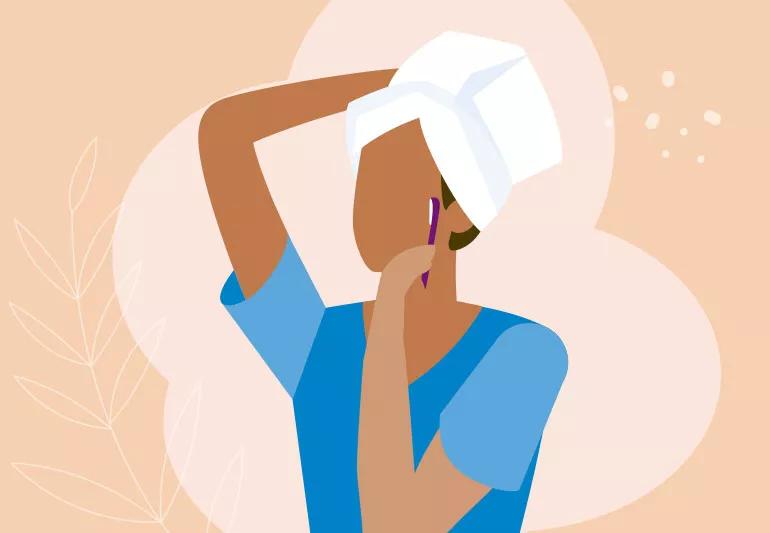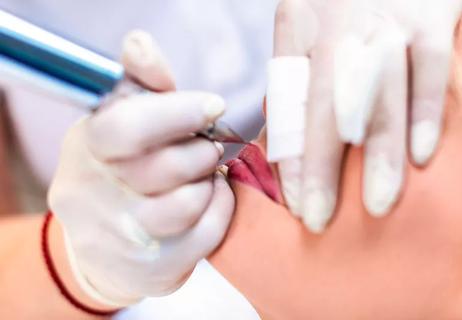Shaving your face can actually give you smoother skin

If you’re on a perpetual quest for smooth skin, dermaplaning at home (essentially, the act of shaving your face) might be just the skin care trick you need — yes, really. And of course, as a bonus, it’ll take care of that pesky peach fuzz, too.
Advertisement
Cleveland Clinic is a non-profit academic medical center. Advertising on our site helps support our mission. We do not endorse non-Cleveland Clinic products or services. Policy
Though many TikTok trends are dangerous and not doctor-approved, this at-home version of a professional procedure is considered pretty harmless, and it can give your skin a bit of a glow.
Dermatologist Melissa Piliang, MD, explains DIY dermaplaning, including how to do it safely.
“Derm” means “skin,” and “plane” means “flat surface.” Dermaplaning is the act of removing the peach fuzz (formally known as vellus hair) from the surface of your skin, an exfoliating process that leaves skin a little bit smoother and brighter.
Doctors, aestheticians and other trained specialists who are skilled in skin resurfacing techniques like dermabrasion and microdermabrasion perform professional dermaplaning. In medical spa and office settings, dermaplaning is done with a tiny scalpel called a dermatome.
Recently, though, social media skin care gurus have begun singing the praises of dermaplaning their own skin. The at-home version calls for a teeny-tiny straight razor that you can purchase just about anywhere you buy skin care products.
“You can buy these in drugstores,” Dr. Piliang says. “They’re single blades on a little plastic handle, and you just lightly rub them over your skin.”
Dermaplaning is a gentle, superficial procedure that has a few simple benefits. Dr. Piliang walks you through some of the reasons you might want to try it and what you can expect.
Advertisement
Dermaplaning is about more than just a fuzz-free face. It also exfoliates, meaning that it removes dead skin cells from your skin’s surface. This helps perk up a dull complexion and can keep pores from clogging.
“As you’re doing it, you can actually look at the blade and see some of those dead skin cells along with peach fuzzy hair,” Dr. Piliang notes.
Like any exfoliating treatment, dermaplaning sloughs off some of the lumps and bumps of dead skin cells, which leaves you feeling baby soft. “Your skin will feel very smooth after doing it,” Dr. Piliang states.
Exfoliating clears the way for fresh, clean skin, and fresh, clean skin is the best canvas for any skin care product. With dead skin out of the way, your products may absorb better into your skin, and makeup may go on more smoothly, too.
Dermaplaning is generally considered safe, effective and low-risk. But Dr. Piliang says there are some things to know about what it might do and who shouldn’t do it.
Dermaplaning lightly disrupts your skin barrier, the living outer layer of your skin that keeps it protected and hydrated. “Your skin may feel a little irritated for a day or so after you do it,” Dr. Piliang says, “so make sure you moisturize well and continue to wear sunscreen.” And that’s advice worth following all the time, not just after dermaplaning!
If you cut or nick your skin, you risk infection (not to mention pain), so be sure to dermaplane slowly and carefully. Always clean your razor both before and after use, too, so you don’t add any bacteria to the equation.
Single-use dermaplaning razors are available, but to be kinder to the earth, you can buy the reusable kind and simply disinfect with plain rubbing alcohol and warm water.
If you’re in the midst of a breakout, put down the straight razor and wait it out. Dermaplaning can agitate existing acne, and it can actually cause more acne by leaving your already-vulnerable skin exposed and susceptible to bacteria.
Similar to the point about acne, skip dermaplaning if you’re dealing with an eczema flare-up or any other active skin issue. Or speak to a dermatologist about professional options, rather than trying to go it alone.
If you’re a woman who’s never considered shaving your face, it may be because an old wives tale has tricked you. Have you heard that shaving will cause your facial hair to grow back in faster, thicker and coarser than before? Let’s dispel that myth: It’s not true.
“It’s a very commonly held misconception, but trimming off the hair above the surface of the skin has no effect on how the hair grows,” Dr. Piliang says. It might feel coarser when it first starts to grow in. But that’s temporary, and there’s a good reason for it.
Advertisement
“As our hair grows, it gets very narrow and tapers at the end, which makes it feel soft,” Dr. Piliang explains. “So, if you cut it off bluntly, like by shaving it, then all of a sudden it can feel a little thicker and coarser. But it’s really just because you cut it.”
As it grows, that incoming hair will begin to taper and soften, too — just like the hair on your head eventually does after you get it trimmed. Think about it: Getting a haircut doesn’t make your hair grow faster, thicker or darker. And neither does dermaplaning.
Definitely don’t dermaplane at home every day or even every other day. The skin on your face is more delicate than the skin on other parts of your body that you might shave on a regular basis, like your legs and underarms, so dermaplaning too often can do damage.
“I wouldn’t do it more than once a week, just so your skin has time to recover in between,” Dr. Piliang advises. “And really, most peach fuzz is so fine that when it grows in that you don’t even see it.”
To learn from Dr. Piliang on related topics, listen to the Health Essentials Podcast episode, “Skin Care Tips, Tricks and Trends.” New episodes of the Health Essentials Podcast publish every Wednesday.
Advertisement
Learn more about our editorial process.
Advertisement

Do a test area first to see how your skin reacts

The semi-permanent tattoo can enhance your lip color and give the illusion of fullness

What you need to know about micropigmentation straight from a cosmetic dermatologist

It’s a great disinfectant for around your home, but not for your skin

Changes in texture, smell, color and performance are signs it’s time to throw the cosmetic item away

Follow the 4Cs — cooling, cleaning, covering and comforting — to start the healing process

Bathing once a day is the general guidance, but you could also have reasons to soap up twice a day or not at all
There’s not one specific cure-all diet for eczema, but it helps to keep track of what you eat and when you experience symptoms

Wearing a scarf, adjusting your outdoor activities and following your asthma treatment plan can help limit breathing problems

Your diet in the weeks, days and hours ahead of your race can power you to the finish line

When someone guilt trips you, they’re using emotionally manipulative behavior to try to get you to act a certain way